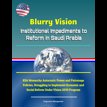Blurry Vision: Institutional Impediments to Reform in Saudi Arabia - KSA Monarchy Autocratic Power and Patronage Policies, Struggling to Implement Economic and Social Reform Under Vision 2030 Program
Blurry Vision: Institutional Impediments to Reform in Saudi Arabia - KSA Monarchy Autocratic Power and Patronage Policies, Struggling to Implement Economic and Social Reform Under Vision 2030 Program
€ 7,36
This late 2017 report has been professionally converted for accurate flowing-text e-book format reproduction. In April 2016, the Saudi Arabian government announced Vision 2030, a highly ambitious reform program designed to move the country away from its reliance on oil revenues and to liberalize its conservative social dynamics. Despite the monarchy's autocratic power, the kingdom has largely failed to employ citizens in the private sector, diversify its industries beyond hydrocarbon-related activity, and privatize the key drivers of its economy since adopting these goals in 1970. The majority of the population is under the age of 30, unemployment is high, and international energy markets are changing, so the country's leadership needs to make changes that provide opportunity for the people and make the economy more sustainable.
This thesis examines why the Kingdom of Saudi Arabia (KSA) struggles to implement economic and social reform. Analyzing interconnected political, economic, and social causes that manifest in the structure of the state and society, the resource curse, and market inefficiencies, the ultimate barrier to reform is the kingdom's political dynamics. Without improvements to governance and modifications to the country's patronage policies, economic change will be limited at best. Elites' preferences for blocking political reform has hampered achievement of economic goals and will continue to prove problematic if not rescinded.
I. INTRODUCTION * A. OVERVIEW * B. VISION 2030: TACKLING KSA'S CHALLENGES * 1. Purpose * 2. Challenges * C. RESEARCH QUESTION * 1. Hypotheses * 2. Significance * II. STATE AND SOCIETY * A. INTRODUCTION * B. POLITICAL ECONOMY * 1. Political System * 2. State and Economy * C. VESTED INTERESTS * 1. Rentier Bargain * 2. Clerical Opposition * 3. Elites Holding On * D. SUMMARY * III. THE RESOURCE CURSE * A. INTRODUCTION * B. THE RESOURCE CURSE * 1. Theory * 2. Causes and Impact * 3. Escaping the Curse * C. THE OIL CURSE IN SAUDI ARABIA * 1. Political * 2. Economic * D. KSA'S ESCAPE ATTEMPTS * 1. Policies * 2. Programs * E. SUMMARY * IV. MARKET INEFFICIENCIES * A. INTRODUCTION * B. BUSINESS ENVIRONMENT * 1. Doing Business * 2. Industrial Constraints * C. HUMAN CAPITAL * 1. Insufficient Skills * 2. Labor Force Integration * D. COMPOUNDING FACTORS * 1. Limited Time * 2. Redistribution's Threats * E. SUMMARY * V. CONCLUSIONS * A. VISION 2030 SO FAR * B. HYPOTHESES * 1. State & Society * 2. Oil Curse * 3. Market Inefficiencies * C. IMPLICATIONS * 1. Political Problems * 2. Avoiding Political Reform
This late 2017 report has been professionally converted for accurate flowing-text e-book format reproduction. In April 2016, the Saudi Arabian government announced Vision 2030, a highly ambitious reform program designed to move the country away from its reliance on oil revenues and to liberalize its conservative social dynamics. Despite the monarchy's autocratic power, the kingdom has largely failed to employ citizens in the private sector, diversify its industries beyond hydrocarbon-related activity, and privatize the key drivers of its economy since adopting these goals in 1970. The majority of the population is under the age of 30, unemployment is high, and international energy markets are changing, so the country's leadership needs to make changes that provide opportunity for the people and make the economy more sustainable.
This thesis examines why the Kingdom of Saudi Arabia (KSA) struggles to implement economic and social reform. Analyzing interconnected political, economic, and social causes that manifest in the structure of the state and society, the resource curse, and market inefficiencies, the ultimate barrier to reform is the kingdom's political dynamics. Without improvements to governance and modifications to the country's patronage policies, economic change will be limited at best. Elites' preferences for blocking political reform has hampered achievement of economic goals and will continue to prove problematic if not rescinded.
I. INTRODUCTION * A. OVERVIEW * B. VISION 2030: TACKLING KSA'S CHALLENGES * 1. Purpose * 2. Challenges * C. RESEARCH QUESTION * 1. Hypotheses * 2. Significance * II. STATE AND SOCIETY * A. INTRODUCTION * B. POLITICAL ECONOMY * 1. Political System * 2. State and Economy * C. VESTED INTERESTS * 1. Rentier Bargain * 2. Clerical Opposition * 3. Elites Holding On * D. SUMMARY * III. THE RESOURCE CURSE * A. INTRODUCTION * B. THE RESOURCE CURSE * 1. Theory * 2. Causes and Impact * 3. Escaping the Curse * C. THE OIL CURSE IN SAUDI ARABIA * 1. Political * 2. Economic * D. KSA'S ESCAPE ATTEMPTS * 1. Policies * 2. Programs * E. SUMMARY * IV. MARKET INEFFICIENCIES * A. INTRODUCTION * B. BUSINESS ENVIRONMENT * 1. Doing Business * 2. Industrial Constraints * C. HUMAN CAPITAL * 1. Insufficient Skills * 2. Labor Force Integration * D. COMPOUNDING FACTORS * 1. Limited Time * 2. Redistribution's Threats * E. SUMMARY * V. CONCLUSIONS * A. VISION 2030 SO FAR * B. HYPOTHESES * 1. State & Society * 2. Oil Curse * 3. Market Inefficiencies * C. IMPLICATIONS * 1. Political Problems * 2. Avoiding Political Reform
| Prijs | Verzendkosten | Totaal | |
|---|---|---|---|
€ 7,36 | € 0,00 | € 7,36 |
Alternatieve producten
© 2016 - 2024 aanbiedingchecker

